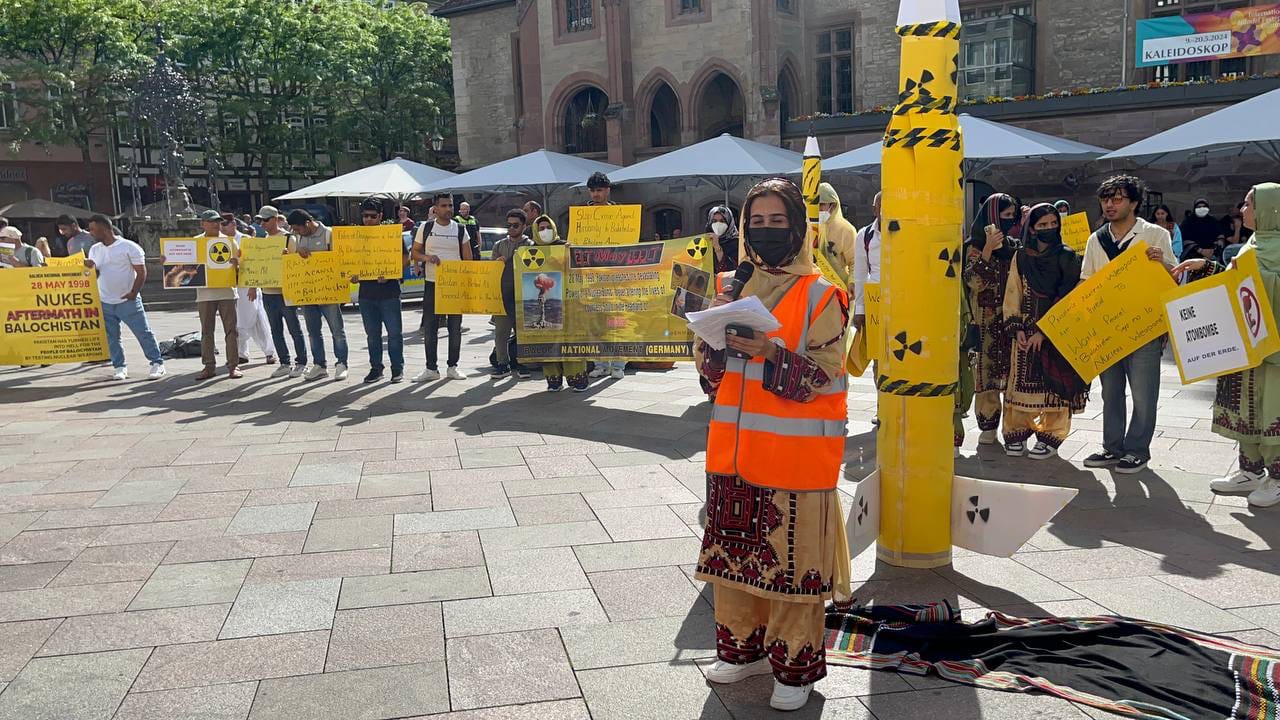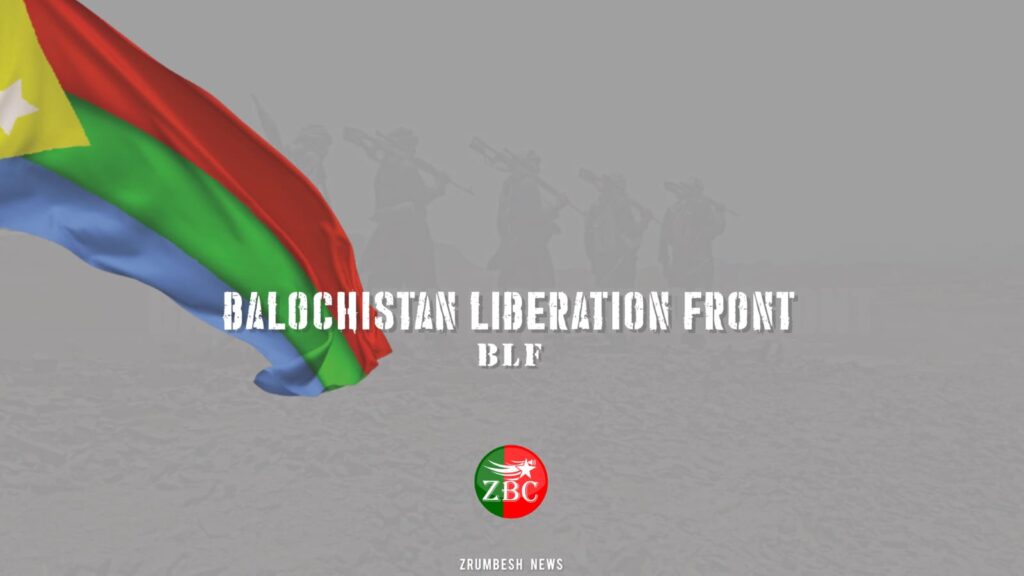On that fateful day in 1998, Pakistan’s nuclear detonation rocked Chaghai, Balochistan, leaving a trail of devastation in its wake.In Göttingen, Germany, the Baloch National Movement mobilized in a poignant protest against Pakistan’s nuclear tests in Balochistan. Marked as a Black Day by the people of Balochistan, 28 May serves as a grim reminder of the cataclysmic event in 1998 when Pakistan unleashed a nuclear explosion in Chaghai, Balochistan. The repercussions were dire: pervasive nuclear radiation inflicted chronic diseases upon the Baloch populace. Tragically, a generation bore the brunt, with children born with disabilities and a surge in afflictions like cancer and skin disorders plaguing the region.
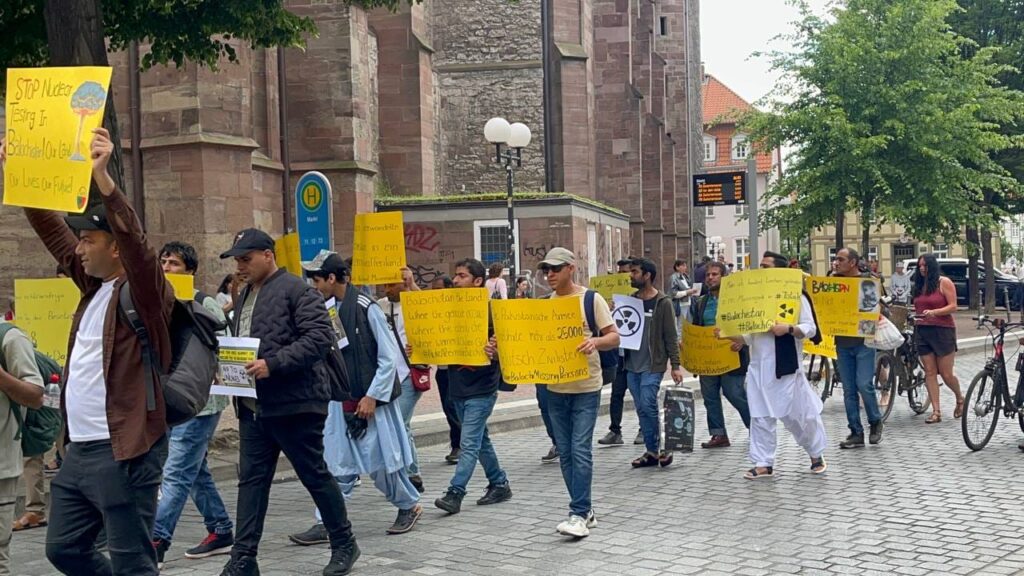
A Musical Tribute presented to Balochistan‘s Heritage“Balach Baloch played national anthem on the benjo saaz, honoring Balochistan’s rich cultural heritage. The region’s landscapes and strong communities reflect a proud tradition in music, dance, poetry, and art. We are committed to preserving and showcasing this identity for future generations.
Resistance Against Colonialism and Militarization in Balochistan”Shar Hassan Baloch, the president of the Baloch National Movement Chapter, said Shar Hassan Baloch, the president of the Baloch National Movement Chapter, said:”Since May 28, 1998, Pakistan has conducted so-called tests in Balochistan, but these were attacks against us because Pakistan occupied Balochistan in 1948. These tests should have been in Punjab, not Balochistan, which is treated as a colony. Pakistan uses Balochistan for testing weapons, including those from China. We stand against this colonialism and exploitation. The Baloch people do not accept these actions and will resist any form of colonialism or capitalism in our land, regardless of the cost.”.
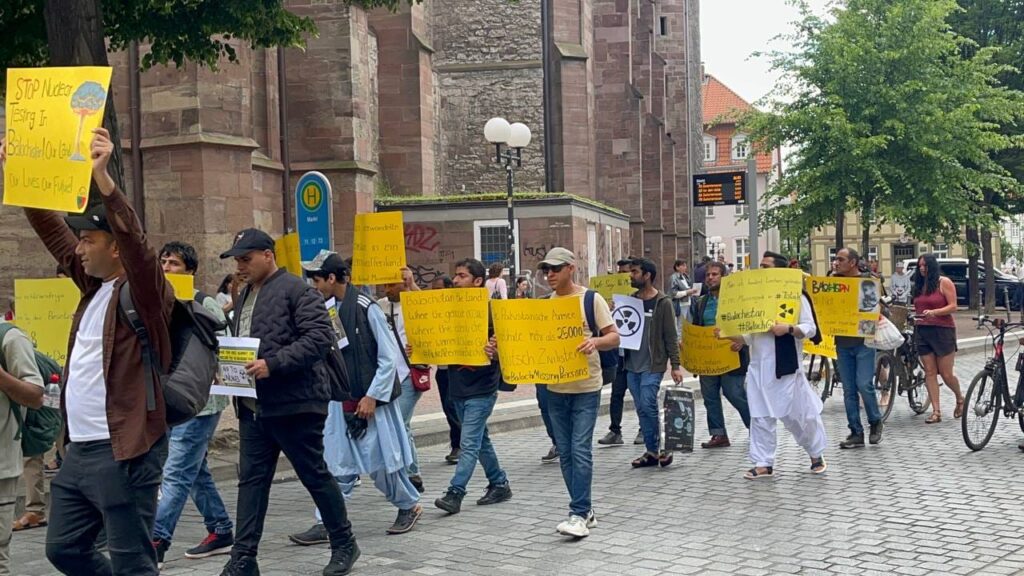
“Condemning Pakistan’s Nuclear Tests: A Call for Global Justice and Solidarity” Banuk Safia Baloch, the vice president of the Baloch National Movement Germany Chapter, declared, “Today, we stand united in condemnation of Pakistan’s nuclear tests in Balochistan, which have left a legacy of suffering and devastation that continues to afflict our people to this day.” She added, “These tests were a flagrant violation of the Comprehensive Nuclear-Test-Ban Treaty, endangering not only the people of Balochistan but also global security.” Her impassioned words underscored the urgency of the situation, urging for accountability and solidarity from the international community.
“Exposes The Hidden Human and Environmental Cost of Pakistan’s 1998 Nuclear Tests in Balochistan” General Secretary of the Baloch National Movement, Abdul Jabbar Baloch, said Pakistan’s nuclear tests on May 28, 1998, in Balochistan led to severe contamination, resulting in high rates of radiation-induced cancers, child mortality, and environmental damage. Independent investigations into these effects are blocked. Additionally, Balochistan suffers from severe human rights abuses by the Pakistani government, including enforced disappearances, extrajudicial killings, and suppression of dissent. The region remains inaccessible to international organizations and journalists, highlighting the need for global attention and action against these violations.
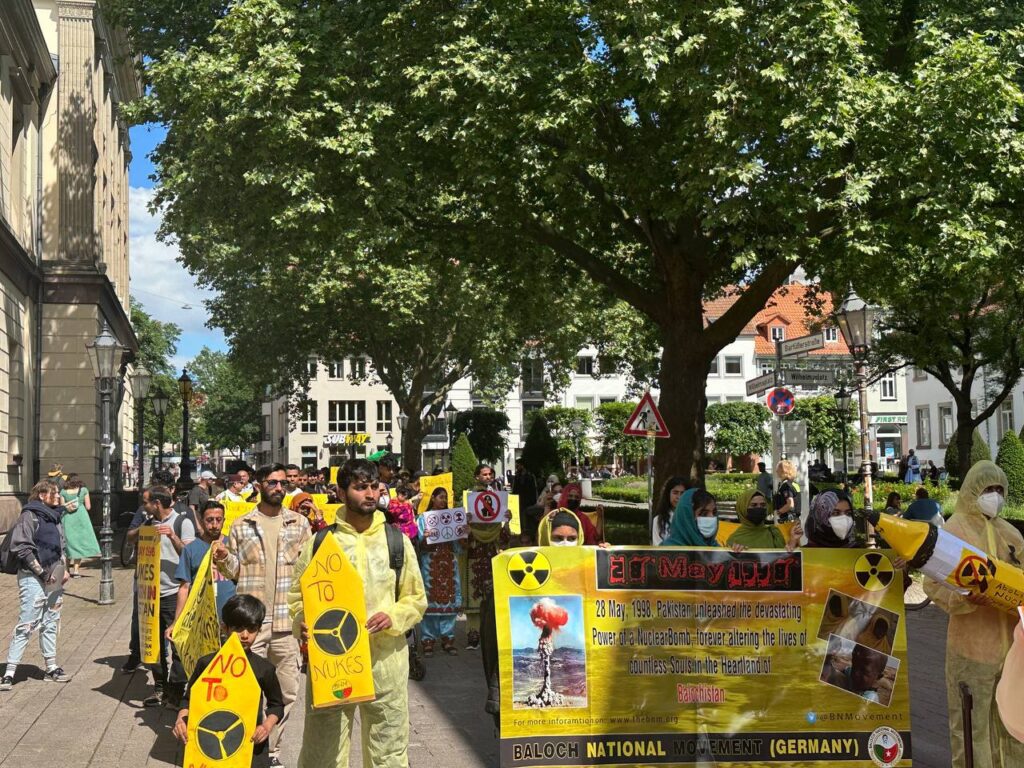
“Standing Strong: Advocating for Justice and Support for Balochistan’s Affected Children” Banuk Shali Baloch, Joint Secretary of Baloch National Movement Germany Chapter, underscored the urgency of the situation, stating, “There’s an urgent imperative for justice, support, and a promising future for the children afflicted by genetic disorders resulting from Pakistan’s 1998 nuclear tests in Balochistan. The global community must heed this call to action by implementing a ban on Pakistan’s nuclear arsenal, recognizing the grave war crimes perpetrated in Balochistan. Additionally, there’s a pressing need for robust healthcare provisions and unwavering support for affected families, rooted in empathy, compassion, and the fostering of an inclusive environment where all voices are valued. Ultimately, safeguarding Balochistan’s future hinges on our collective commitment to advocacy and action for the safety and well-being of its succeeding generations.”
The suffering of Balochistan: A Call for Justice” Asghar Baloch, the former president of the Baloch National Movement Germany Chapter, said, The suffering inflicted on Balochistan by the Pakistani Army is clear. In 1998, Pakistan conducted nuclear tests in Chagai, displacing its residents without warning. This forced eviction left hundreds of people without their homes. The international community must acknowledge and address this injustice.“Unveiling Pakistan’s Nuclear Menace: A Call for Global Action and Justice”Member of the Baloch National Movement, Asif Baloch, passionately denounced Pakistan’s nuclear tests in Chagai, Balochistan, on May 28, 1998, highlighting the day’s solemn significance as “Aasrokh,”
a day of mourning in Balochistan’s history. He condemned the use of “Takbeer Allah o Akbar,” branding the weapon as the “Islamic Bomb,” and expressed grave concern over Pakistan’s development of additional nuclear weapons. Asif underscored the devastating aftermath of the tests, including radiation effects and widespread diseases, urging the international community to condition financial support on Pakistan’s nuclear disarmament.
“Reclaiming Baluchistan: Healing the Land, Protecting Lives” Sammo Baloch said, “We need to speak up and make sure someone takes responsibility for what happened,” to emphasize the necessity of accountability for the consequences of the nuclear tests in Baluchistan. She added that it’s crucial for the government and other big organizations to focus on fixing the damage, restoring the environment, and aiding the affected communities, highlighting the urgent need for action to address the ongoing challenges faced by the region.
“The Silent Victims of Nuclear Testing” Shari Baloch, addressing the participants, said, “The pain of our people in Baluchistan cannot be ignored any longer,” highlighting the suffering inflicted by the nuclear tests and the subsequent disregard for the well-being of the region’s inhabitants.
“Standing Against Nuclear Tests and Oppression in Balochistan”Eman Baloch the Member of Baloch National Movement and Balach Qadir Said, We protest the nuclear tests in Balochistan. Since May 28, 1998, our people have suffered from illnesses and environmental damage. We demand an end to these tests. Our government must stop these dangerous experiments. Our people deserve a peaceful, safe future without nuclear weapons.Balochistan has long fought for its rights but faces violence and oppression from the Pakistani government. This is inhumane and illegal. We call on the international community and media to expose the truth and take action.
„A Powerful Performance Against Nuclear Threats“When the rally reached Gänseliesel, activists performed a powerful anti-nuclear act, depicting a world where humans cannot breathe. This theater piece was effective because it created new rhetorical and visual languages to critique and satirize the bureaucratic and militaristic language used in nuclear planning.
The Baloch National Movement demands the deployment of an independent international research team to Chaghai to assess the impact of nuclear radiation. Pakistan must be held accountable and severely penalized for its reckless atomic test in Balochistan, which has caused continuous harm to the local population. The catastrophic effects of this test should be made public, and stringent measures must be implemented to disarm Pakistan of its nuclear arsenal.
